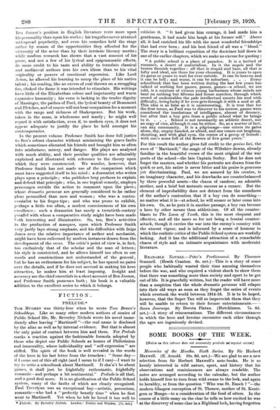BEN JONSON. - 1 -
THE latest accession to the " English Men of Letters " series fills an important gap in a collection which was almost as remarkable for its omissions as its inclusions. It is true that
• ThsCirsat War : Vidory Volum, By Louis Raemaekers. " The Final Phase from the Entry of America to the Conclusion of Peace." London : Thu Fine Arts Society. [Subscription ten guineas before publication.]
t Ben Jon on. By G. Gregory Smith. " "%palish Men of Letters." Leaden: Macmillan. Las. net.] Ben Jenson's position in English literature rests more upon his personality than upon his works ; his tragedies never attained widespread popularity, and even his comedies held the stage rather by reason of the opportunities they afforded for the virtuosity of the actor than by their intrinsic literary merits ; while modern research has shown that a vast amount of his prose, and not a few of his lyrical and epigrammatic efforts, do more credit to his taste and ability to translate classical and mediaeval authors into his own idiom than to his vital originality or powers of emotional expression. Like Lord Acton, he allowed his learning to usurp the place of his native talent ; his reading, like an excess of coal thrown on a struggling fire, choked the flame it was intended to stimulate. His writings have little of the Elizabethan colour and impetuosity and warm expansive humanity ; his verse is lacking in the tender dignity of Massinger, the pathos of Ford, the lyrical beauty of Beaumont and Fletcher, and of course will not bear comparison for a moment with the range and richness of Shakespeare. But his work, taken in the mass, is wholesome and manly ; he might well regard it with satisfaction, even if, to modern eyes, it does not appear adequate to justify the place he held amongst his contemporaries.
In the present volume Professor Smith has done full justice to Ben's robust character without minimizing the grave faults which sometimes alienated his friends and brought him so often into misfortune, misery, and danger. His plays are analysed with much ability, and their peculiar qualities are admirably explained and illustrated with reference to the theory upon which they were constructed. We wonder, however, that Professor Smith has not made use of the comparison which must have suggested itself to his mind : a dramatist who writes plays upon a principle ; who publishes long prefaces to explain and defend that principle ; who, in one topical comedy, employs personages outside the action to comment upon the piece ; whose dramatis personae are generally considered to The rather ideas personified than men and women ; who was a contro- versialist to his finger-tips ; and who was prone to exhibit, perhaps a little too often, a modest consciousness of his own excellence : such a dramatist has surely a twentieth-century parallel with whom a comparative study might have been made loth interesting and illuminative. So, too, Ben's activities in the production of masques, upon which Professor Smith very justly lays strong emphasis, and his difficulties with Inigo Jones over the relative importance of author and mechanist, might have been enlivened by modern instances drawn from the development of the revue. The critic's point of view is, in fact, too exclusively that of the scholar and the man of letters ; his style is constricted, and he allows himself too often to use words and constructions not understanded of the general but he has an enthusiasm for his subject, he has spared no pains over the details, and if he does not succeed in making his hero attractive, he makes him at least imposing. Insight and accuracy are the chief essentials in a short account of Ben Jenson, and Professor Smith possesses both ; his book is a valuable addition to the excellent series to which it belongs.



































 Previous page
Previous page